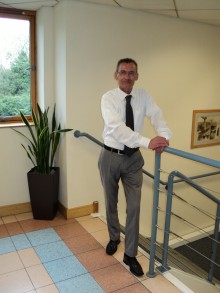 Last week, I introduced you to the idea of me blogging about people’s Recovery Story.
Last week, I introduced you to the idea of me blogging about people’s Recovery Story.
Let’s start with Kevan’s Story. Let me say first that I have never met Kevan Martin, other than on Skype (from a distance of over 8,000 miles). However, I feel that I have got to know Kevan reasonably well during the process of writing his Story and through our subsequent communications. He’s also been very helpful and supportive with a past problem in my life.
Kevan is one of my heroes. Here is a person who shows what recovery is all about and what can be achieved. Kevan had a drinking problem for over 25 years. He was in and out of psychiatric hospital for eight years. He used to visit his GP to be readmitted to hospital to escape the isolation, fear and homelessness he experienced in the ‘outside’ world. He was someone that people, including his own family, had given up on.
Kevan turned things around, big-time! He not only stopped drinking and improved his life immeasurably, he started a recovery support group in his own living room. This support group grew and grew and grew… such that the resulting organisation NERAF now has 41 staff and 50 volunteers working across the north-east of England. Not bad for a so-called ‘failure’ – and a Newcastle United soccer fan!
So how did he do it? Here, I’m going to focus on what I consider to be some of the important elements contributing to Kevan’s recovery. Let’s start with some of Kevan’s thinking process.
It took many years for Kevan (and the professionals around him!) to realise that he had a drinking problem. Despite this realisation, he didn’t know what to do. Now out of psychiatric hospital – and a rehab which had done nothing to help – Kevan kept stopping drinking for some months and then starting again. Relapse followed relapse. In desperation, he visited his psychiatrist and literally begged for something to help to him.
The psychiatrist suggested that he take Antabuse, a drug that produces a strong negative reaction if a person drinks. Kevan liked this idea, since he is a ‘black and white type person’ and he thought he needed to put in this ‘do-or-die’ situation. He believed that if he drank whilst on disulfiram he could die. At the same time, he knew that Antabuse was not in isolation going to sort his problem, but he felt it would give him the ‘freedom’ to sort ‘the shit’ in his life.
I believe that a fear of dying if he drank played an important role in the early stages of Kevan’s recovery. The importance of this fear in early recovery is something that another of our recovery story-tellers (Michael Scott) talks about.
What Kevan wasn’t prepared for was the increased cravings he experienced after going on Antabuse. He would often wake in the middle of the night thinking, “I need my mate.” He couldn’t understand what was happening. “I knew that I couldn’t be with my friend anyways, so why wasn’t my brain accepting it?”
Research has provided a psychological explanation for this enhanced craving. If you block access to something that a person is addicted to, they often experience more severe craving. Heavy smokers will tell you how they experience strong cravings when they realise they have run out of cigarettes and they cannot get any more because the pubs and shops have all closed for the night. Kevan believed he couldn’t drink because he would die and this belief psychologically enhanced his cravings.
One of things that has always struck me when talking to people about their recovery is the appearance of special moments or moments of clarity that occur during their recovery journey, moments that help change the course of this journey.
Kevan experienced one of these moments when he felt an unexplained urge to enter a church he was passing. He sat down in the church, fell asleep and was woken up by the vicar. Kevan broke down, cried like he had never cried before and poured his heart out. The vicar then explained to Kevan how part of his job was to console people who had lost loved ones. He helped them come to terms with not being with someone they loved.
Kevan went away thinking about what was said. He realised that he was in some sort of mourning process. “I was missing my best mate, so bloody much it actually hurt.” However, he knew that I was better off without his best friend, even though it was still alive!
After this conversation, Kevan’s thinking processes began to change. He started to think about the detrimental effects that alcohol had had on his life. He describes a stark realisation that he had allowed alcohol to impact so much on his life. He questioned himself whether he could have prevented this, coming to the conclusion: “Yes, simply by not allowing alcohol to dictate my lifestyle…”
Kevan began to accept that he was an addict, “because no matter what I do and enjoy I always want more.” It didn’t matter whether it was alcohol, judo or work – he showed addictive behaviour. Whilst Kevan could see that alcohol had caused much damage in his life, he realised that he couldn’t blame the drug. He was the one who was responsible for what had happened and for what would happen in the future.
“As far as I can see, all of my addictions have been down to how I lived my life. I was not only responsible for my addiction, but also for overcoming it and getting better.”


